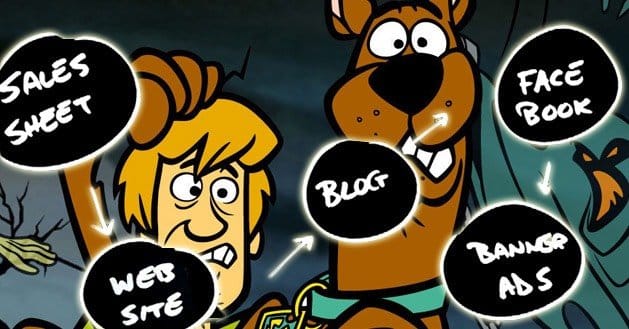 Written by ContentPowered.com
Written by ContentPowered.com
In this day and age, most business owners know that having a social media presence – particularly on Facebook – is very helpful to (and even necessary for) business success. More and more customers are wanting to connect with brands and companies on social media, and interaction is one of the key factors that search engine spiders look for when determining how valuable a webpage is. Given all of this information many business owners put a lot of thought into the content on their Facebook page, which is a good thing. But, just like every good thing, it’s possible to have too much of it. Below are some indications that you might be thinking too much about your Facebook content. Content that is overdone, over-thought, or over-analytical can turn off potential customers just as much as having no content or social media presence can. So take note of the following signs you’re over-thinking your Facebook content, and make sure your content is accomplishing its goal.
Your Content Reads Like a Business Report
It’s important to communicate with your Facebook followers, customers, and prospects about business updates. However, the way you update your social media followers is vastly different from how you would update, say, the CEO. Many business professionals are used to providing in-depth analysis when creating updates and content about the status of their company or brand. But Facebook followers are not CEOs, and they don’t care so much about stock options as they do about product offerings, sales, and the like. Have someone outside of your business – ideally someone in your demographic – read your Facebook content before you post it. Find someone who you trust to give you honest feedback. Sometimes getting an opinion from outside of the business world can help you adjust your content and will allow you to see when your content is becoming too much like a CSR report and not enough like a friendly update.
Your Updates Have Graphs
Unless you happen to sell graphs, the people you are interacting with online usually don’t care about graphs. This relates in some way to the above point about being too analytical in your content, but if you’re ever tempted to post a graph or pie chart, just don’t. Post pictures of your products, current events, celebrities who are wearing your products or drinking your gourmet coffee, but don’t post business graphics.
You Freak Out Over Typos
If you say you’re having a 50 percent off sale when you meant 15, that’s an issue. But if you’re constantly combing your Facebook content looking for typos before posting it, you’re wasting time. This is not a novel or a piece of history, it’s a Facebook update. Most people skim content as they’re scrolling through their news feed, and they won’t catch small errors that don’t change the meaning of your message. If you have an editor who only focuses on Facebook posts, or you spend more than a quick minute or two reviewing content before you post it, you’re over-thinking it.
Being Concerned Because You Don’t Have Comments
Just because you aren’t getting comments on your Facebook posts doesn’t mean you need to spend a day dramatically revolutionizing your content strategy. This is particularly true if you’re posting things like “Stay on the lookout for our Holiday Sale!” or “New gardening soil to be released in time for spring!” If you think about it, there’s really nothing to comment on – it’s just information. You might get a few people saying “I’m really excited for this!” but other than that you’ve simply provided info. If you really want comments ask a question or, even better, ask for your customer’s opinion about something. If you’re still not getting comments, then maybe it’s time to look into your marketing strategy. But on the whole, if you have a ton of followers but not a lot of comments, it may just be that your customers saw your information while scrolling through and didn’t feel the need to comment. It’s usually nothing to be too concerned over, and if it’s something you want to change it’s usually an easy fix, like rephrasing your post as a question or poll.
Obsessing Over Clickthrough Rate Benchmarks
Nobody will argue with you that clickthrough rates are important. But when it comes to comparing your site or Facebook fan page to that of other companies, particularly those not in your industry, it becomes an almost useless endeavor to look at the benchmarks as an indication of success or failure. Clickthrough rates are just one piece of information in a very large collection of information types you can use to see how well your Facebook page or website is performing. It’s important to know how many people are interacting with you or clicking through, sure, but don’t go into crisis mode due to unfavorable clickthrough rate benchmarks alone.
Content That’s Too Long
This is your Facebook page, not a blog. It’s common to see business owners who write out long form Facebook updates as though they were creating a blog entry, but this is not necessary. In fact, this will likely deter people from reading your Facebook updates. Keep in mind that people who are reading your Facebook posts are very likely doing it from a mobile device, and are almost certainly scrolling through rather quickly. This is not the place where people look for thought-provoking content. This is where they go to see what you’re selling, what sales you have, new products you’re offering, and maybe things like storefront updates or trade shows you’ll be attending in the area. If your posts start going beyond five sentences, you’re over-thinking it.
Trying to Impress
You want your customers to like you, be interested in your product, and maybe even laugh a little when they read your updates. But you don’t want to try so hard that it’s obvious you’re trying to impress them. Don’t be the person that shows up to a beach party in an Armani suit. Facebook is a relaxed environment, so always create your content as though you’re talking to a friend – while maintaining professionalism. If your content is full of attempted jokes, big words, or bold letters and excessive exclamation marks, you’re over-thinking it.
Posting Too Often
Finally, it’s common for business owners to feel as though if they don’t post on Facebook all the time they’ll lose their customers. To correct for this, they start posting about absolutely everything – even things that don’t really matter to their customers – and they become annoying instead of helpful or informative. If you’re posting more than three times a day, you’re over-thinking your content. The only exception to this would be if your business somehow requires constant updates, like you communicate with people about stock opportunities or a sports game. In that case, yes, your followers probably want frequent updates. Just use common sense. If you sell a product, your customers usually only care about when they can save money, special opportunities just for them (like Facebook fan promotion codes), when you’re introducing something new or discontinuing a product, and where you’ll be (like the trade show example mentioned above). If you’re posting about something that doesn’t relate to their shopping habits or have to do with subjects your demographic is interested in, you might be over-thinking your content.
In short, keep it simple and relaxed. Obviously you want to keep your content professional, so you won’t be filling it with slang. But on the whole, your customers want to relate to you and your company on a more personal level. Think about your content as though you’re telling a friend “Hey, guess what?” or “Hey, check this out.” Keep it quick, scannable, and get to the point in the first sentence because many people won’t open up a longer post or click “see more” to read a long post. And if you’re really concerned, ask a question and take a poll of your followers to see what they like or don’t like about your current Facebook fan page. That should give you a nice snapshot of customer opinion without having to spend hours doing marketing analysis.

